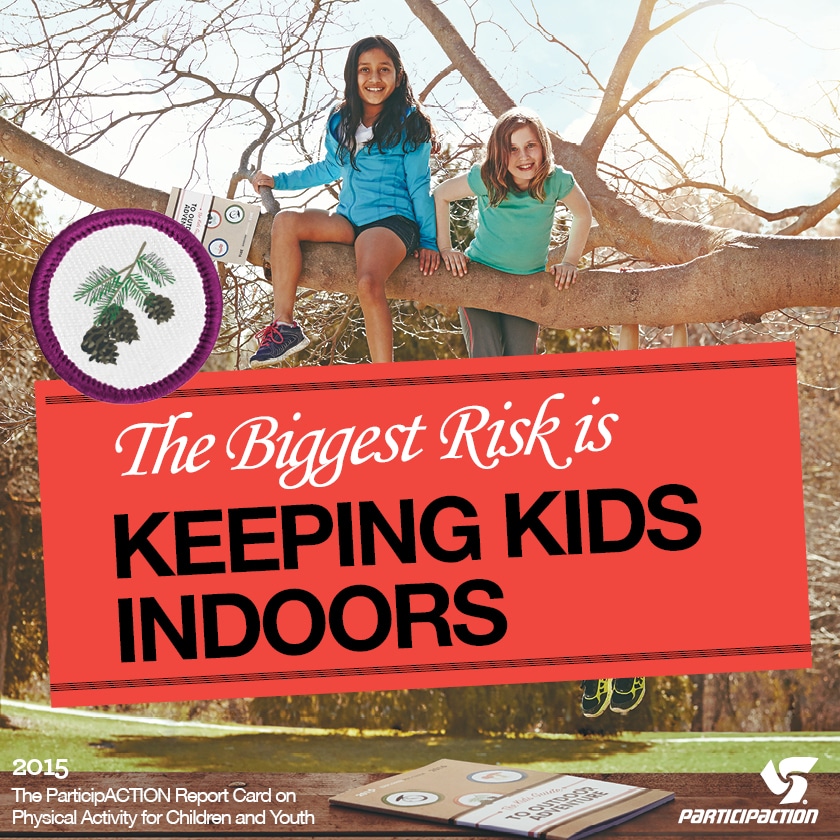In an era of schoolyard ball bans, bylaws that restrict tobogganing and parents’ frequent calls of “Be careful” or “Wait for me,” are we limiting our children’s ability to engage freely in active play outdoors? Over-supervising kids or keeping them indoors to ensure they are safe limits their opportunities for physical activity, endangering their long-term health. It’s time to get out of kids’ way, let them play outside and give them the freedom to occasionally scrape a knee.
The 2015 ParticipACTION Report Card (formerly the Active Healthy Kids Canada Report Card) was released today in concert with an evidence-informed Position Statement on Active Outdoor Play. Available in this year’s Report Card, the Position Statement was developed by the Healthy Active Living and Obesity Research Group at the Children’s Hospital of Eastern Ontario Research Institute (HALOCHEO), ParticipACTION and a group of 14 other organizations, and was supported by over 1,600 stakeholders from across Canada and around the world. It finds that access to active play in nature and outdoors – with its risks – is essential for healthy child development.
“We have lost the balance between short-term safety and long-term health. In outdoor play, risk doesn’t mean courting danger, but rather giving kids the freedom to assess their surroundings and make decisions, allowing them to build confidence, develop skills, solve problems and learn limits,” says Dr. Mark Tremblay, Chief Scientific Officer, ParticipACTION Report Card, and Director of HALOCHEO. “Kids move more when they are outside, have some freedom to roam unsupervised and engage fully with their environments, which will set them up to be more resilient and less likely to develop chronic diseases in the long run.”
Research shows that kids are more likely to be physically active when playing outdoors and less likely to engage in higher levels of physical activity if a parent or supervising adult is present. Despite this, safety concerns lead to excessive supervision and keeping kids indoors. But, is outdoor play really something to fear?
What many adults recall from their childhood as thrilling and exciting play that tested boundaries – such as exploring the woods, rough housing, moving fast or playing at heights – is often called risky play these days. While these activities could lead to injuries, the vast majority are minor. The fear of stranger abduction is also disproportionate to the risk; the odds are estimated to be about 1 in 14 million.
Despite common knowledge that Canadian kids need to sit less and move more, the two lowest grades in this year’s report card are a D- for Sedentary Behaviours and a D- for Overall Physical Activity. Child and youth physical activity levels remain alarmingly low, with only nine per cent of five- to 17-year-olds meeting the Canadian Physical Activity Guidelines of 60 minutes per day of moderate- to vigorousintensity physical activity.
“In order to help ensure Canadian children get enough heart-pumping activity, we need to recognize that they are competent and capable to go out and explore on their own or with friends,” says Elio Antunes, President and CEO, ParticipACTION. “This will also allow them to have more fun and learn
how to manage and assess risks independently. Children move more, sit less and play longer in selfdirected outdoor play, so the biggest risk is keeping our kids supervised indoors.” Among the 11 grades assigned in the Report Card and in addition to the above, other grades include:
- “D” for Active Transportation
- “C+” for School
- “C+” for Families and Peers
- “B-“ for Organized Sport & Physical Activity Participation
- “B-“ for Government
- “B+” for Community & Environment
- “A-“ for Non-Government
The Position Statement includes recommendations directed at parents, educators and caregivers, health professionals, injury prevention professionals, school and child care administrators, media, attorneys general, governments and society at large to help increase all children’s opportunities for selfdirected play outdoors.To download the 2015 ParticipACTION Report Card Highlight Report, including the Position Statement, or the 58-page Full Report, please visit www.participactionreportcard.com.

About the Report Card
The ParticipACTION Report Card on Physical Activity for Children and Youth (formerly the Active Healthy Kids Canada Report Card) is the most comprehensive assessment of child and youth physical activity in Canada. The Report Card synthesizes data from multiple sources, including the best available peer-reviewed research, to assign evidence-informed grades across 11 indicators. ParticipACTION relies on its strategic partner, The Children’s Hospital of Eastern Ontario Research Institute’s Healthy Active Living and Obesity Research Group (CHEO-HALO), to research, develop and communicate the Report Card. Over the years, the Report Card has been replicated in numerous cities, provinces, and countries, where it has served as a blueprint for collecting and sharing knowledge about the physical activity of young people around the world. Production of the ParticipACTION Report Card has been made possible through financial support from RBC, The Lawson Foundation, the MLSE Foundation, the Heart and Stroke Foundation, provincial and territorial governments through the Interprovincial Sport and Recreation Council (ISRC) and IA Clarington Investments.
About ParticipACTION
ParticipACTION is a national non-profit organization that helps Canadians sit less and move more. Originally established in 1971, ParticipACTION works with its partners, which include sport, physical activity, recreation organizations, government and corporate sponsors, to make physical activity a vital part of everyday life. ParticipACTION is generously supported by the Government of Canada. For more information, please visit www.participACTION.com.
-30-
For more information or copies of the ParticipACTION Report Card, or to schedule an interview, please
contact:
Meaghan Beech
Hill+Knowlton Strategies
W: 416-413-4650
M: 647.463.4467
meaghan.beech@hkstrategies.ca
Katherine Janson
ParticipACTION
W: 416-913-1471
M: 647.717.8674
kjanson@participACTION.com




